2013 has been truly awesome for new queer and/or feminist things to read. Here are some of the best ones.
The Top 10 Queer/Feminist Books of 2013
10. How Poetry Saved My Life, by Amber Dawn
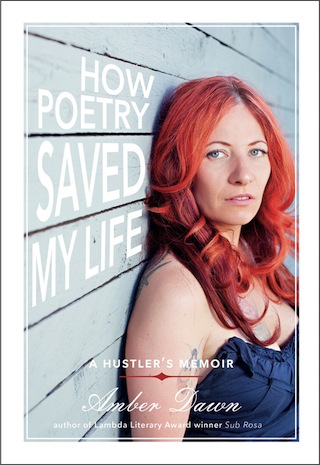
Amber Dawn combines memoir and poetry into something that is both at once as she discusses her experiences as a writer, sex worker, survivor and queer-identified person.
In her interview with Ali, Dawn says:
“Many memoirs cover a chronological time frame—travelling from the author’s “inciting moment, through a sort of character or personal arch, to an ending resolution. I think this popular memoir formula is much too tidy to capture most of our lives, especially if our lives are under-represented in the mainstream. Plus, I didn’t have the emotional strength to write a chronological memoir about sex work and survivorship. Poetry offered me a language of beauty and dynamism to write out my more vulnerable ideas and experiences. I’ve always felt comfort in reading and writing poetry. Poetry is the closest thing I have to a spirituality.”
9. The Summer We Got Free, by Mia McKenzie
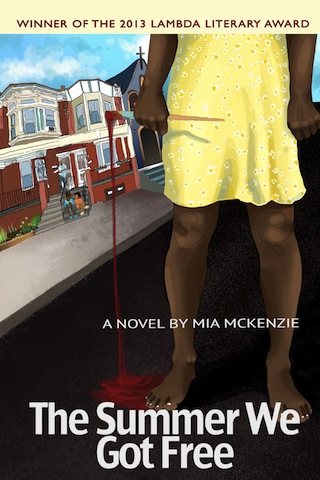
The Summer We Got Free is a fearless, semi-magical-realist queer coming-of-age story that also won the 2013 Lambda Literary Award for debut fiction. And Moya Bailey liked it.
In a review at Lambda Literary, Dawn Robinson writes:
“I will not give you all of the salient details of this layered, complex, and absorbing novel in this brief review—no spoilers here. Still, I need to ask you a few clarifying questions. Are you interested in a novel that is simultaneously critical social commentary, ghost story, murder mystery, and queer love story? If you were interested in such a novel, would it matter to you that the craft of the writing is deceptively plain, and in that simplicity, achingly poignant, laser-like in its facility and effect? Me too. I love that.
Finally, if you found out that the author was a fiercely brilliant black queer woman, who layers on discovery, insularity and secrets with a deft touch, would you be queuing up to get a copy of this book? Thought so.”
8. Nevada, by Imogen Binnie
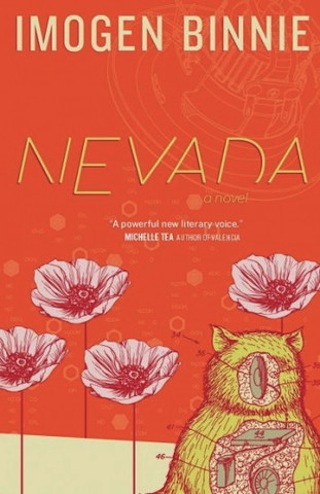
Nevada is about what happens when you work at a used bookstore and love your bike more than your girlfriend and drink maybe too much and take drugs but inject only estrogen and break up with your girlfriend and travel across the country.
In an interview with Dan Fishback on Emily Books, Binnie says:
“But with Nevada specifically I was thinking a lot about what kinds of stories we are told and therefore get to tell about trans women and how they almost never have much to do with the lived experiences of, like, myself, or most of my friends. So this project, for better or worse, was just to tell a different story. And also, to write a book I wish I could read. So while writing the book wasn’t for an audience in a specific way, I wrote it with an awareness of (and anger at) the boring tropes we see in trans narratives over and over.”
7. Bi: Notes for a Bisexual Revolution, by Shiri Eisner
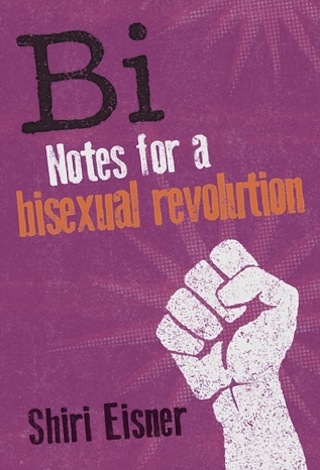
Eisner describes Bi as her “attempt to create a radical bisexual politics, and it is deeply informed by intersectionality, feminism, trans politics and race politics – not in the least because I myself am a trans* person of color.” She addresses bisexual politics through multiple facets and is informed by feminist, trans* and queer politics, theory and activism.
A.J. Walkley calls it a “definite must-read” and writes:
“The research Eisner has done for this book is clear from the beginning and the result is an incredible historical review of the bisexual movement from a whole host of perspectives and views, as well as clear ideas for revolutionizing it from here on out. With chapters on bisexuality, monosexism and biphobia, privilege, feminism, women and men, trans*, radicalization and what Eisner calls the “GGGG movement,” or the Gay-Gay-Gay-Gay movement, readers are exposed to the major issues that have impacted bisexuals over the years and those that are affecting us today.”
6. One Hundred Apocalypses and Other Apocalypses, by Lucy Corin

Lucy Corin’s experimental collection of 100 short stories about the end of the world has received high praise from the Rumpus and the LA Review of Books, which calls it “strange, transportive, and challenging,” “ageless,” and draws flattering comparisons with George Saunders.
In an interview with the Rumpus, Corin says:
“I decided I wanted to write an apocalyptic narrative, but the more I thought of it, it seemed bizarre and untenable to me to pick one, so I just didn’t.
I was interested in beginning and ending something as quickly as possible, as many times as possible, as a way of getting at a cultural fantasy life that has to do with the apocalyptic. Nobody can live in this culture and not realize that people really love this shit. We just love it. And so I started writing one after another and investigating it myself and talking to people about their own apocalyptic fantasy lives.”
5. Excluded: Making Feminist and Queer Movements More Inclusive, by Julia Serano
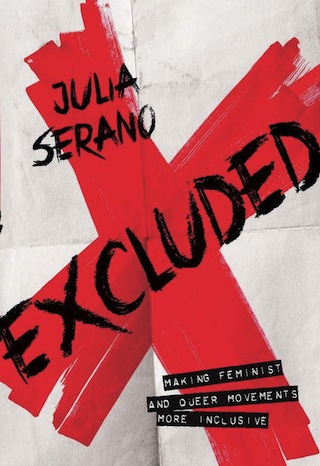
In Excluded, Julia Serano (author of Whipping Girl) discusses how queer and feminist movements challenge sexism but also police gender and sexuality, and what to do about that.
In an interview with Persephone Magazine, Serano says:
“Obviously, all these forms of sexism and marginalization are different, and I am not trying to conflate them or imply that they are all the same. But in studying them, it seems clear that there are parallels between all of them — in the way that they are enforced, and in the way that the marginalized group tends to react to their circumstance. Rather than merely petition for the inclusion of each excluded group on a one-by-one basis (as I did in Whipping Girl, and as many others before me have done), I wanted to try to get at the root of why we tend to create double standards and hierarchies, and how we can learn to recognize and challenge them in a more general sense. And I wanted to offer possible solutions that will help to reduce exclusion and marginalization in all cases, whether in the straight-male-centric mainstream or within our own queer and feminist communities and movements.”
4. Blue is the Warmest Color, by Julie Maroh
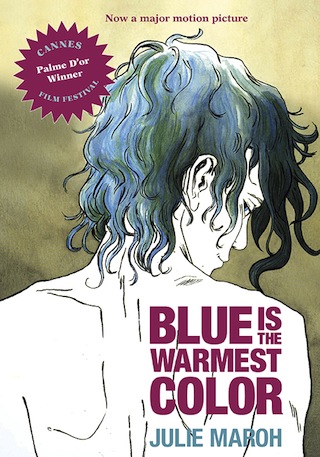
Everyone’s been talking about the film that won the Palme d’Or at the 2013 Cannes Film Festival for months, and it’s been getting a lot of criticism for its rather extended lesbian sex scene. But the graphic novel the film is based on is sweet and lovely and significantly less male gazey.
In a review at Slate, June Thomas writes:
“Maroh, who was just 19 when she started the comic, manages to convey the excitement, terror, and obsession of young love—and to show how wildly teenagers swing from one extreme emotion to the next. The graphic novel also contains some stirring sex scenes. […]
Ultimately, Blue Is the Warmest Color is a sad story about loss and heartbreak, but while Emma and Clementine’s love lasts, it’s exhilarating and sustaining. In the scene reproduced here, Emma tells the infatuated Clementine about her coming-out process and her relationship with her girlfriend, Sabine.”
3. My Education, by Susan Choi
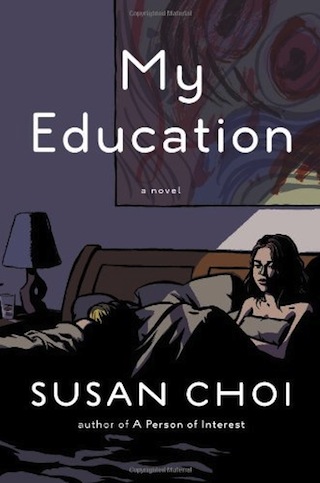
The latest novel from Pulitzer Prize finalist Susan Choi is about a grad student who begins an affair with her professor’s wife, and who then reflects on the affair 15 years later. In the New York Times, Emily Cooke calls it “elegantly written,” and writes:
“Choi has taken seriously the sexual love between two women who see themselves as straight. This choice of subject matter is an exciting one, for if a number of the great novels of the past century have been stories of gay love, no really adequate literature of bisexuality exists. Regina does not concern herself with the terms ‘lesbian’ or ‘bisexual,’ and she is nonchalant about the sex of her new lover. […] In love of great intensity and depth the specificity of the beloved can overwhelm any category he or she belongs to — and Regina swears that her feeling for Martha is ‘so unto itself it could not refer outward, to other affairs between women or even between human beings.'”
2. Hild, by Nicola Griffith
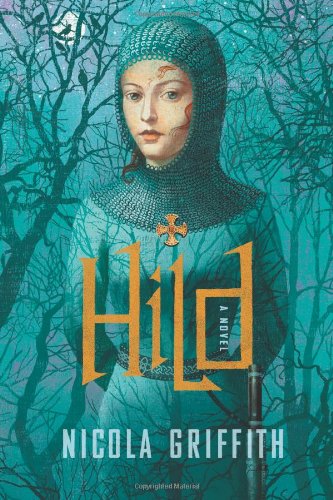
Set in violent seventh-century Britain, Hild tells the story of the pre-sainthood St. Hilda of Whitby, a girl who establishes herself as the seer to a ruthless king who finds her indispensable — until he doesn’t. It’s impossible not to love Nicola Griffith — she’s also the author of the feminist sci-fi novel Ammonite, the suspense-thriller-lesbian-romance The Blue Place, and lovely defences of why good sex in literature is important and Hild’s (bi)sexuality.
In an interview with herself at the Nervous Breakdown, Griffith says:
“As soon as I picked up her story–she was working out the weave of seventh-century British politics, tracing influences to their source–I thought, This is where I belong. […]
This story is epic in many ways–wars, dynasties, revenge, friendship, religious power struggle, ethnogenesis, sex, risk, joy–but in others it’s not. There’s no Meanwhile, a thousand leagues away in the point-of-view of a character you’d forgotten existed…, for example. Hild is in every single scene.”
1. The Feminist Porn Book, edited by Tristan Taormino
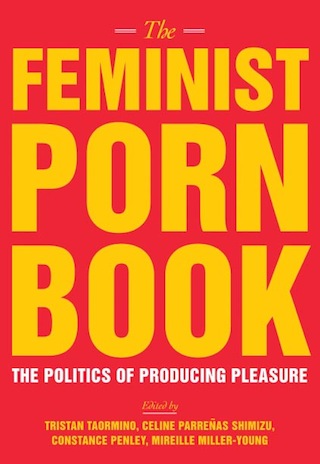
The Feminist Porn Book already feels like it’s been around for years just because it should have been — it fills a hole in contemporary feminist writing so big that I almost feel bad making a joke about filing holes.
The book features feminists from the porn industry and academia, including Susie Bright, Candida Royalle, Betty Dodson, Nina Hartley, Dylan Ryan, Jiz Lee, April Flores and more, talking about where feminist porn has been and where it might go. In an interview with Salon, Taormino says:
“One of the things we’re responding to is that there’s this notion that certainly is propagated by anti-porn feminists and other people, which is that there is one thing called porn with a capital ‘P.’ And it’s monolithic and we can qualify it in all these different ways and say this is what it looks like and this is what it does. As Constance says, ‘That’s just not true.’ What there is is a whole series of pornographies with a lowercase ‘p,’ and that’s what we have to look at and investigate. There is no one thing, and she even challenges the notion that there is a clear division between mainstream porn and independent porn, or mainstream porn and feminist porn, because there are feminists working within the mainstream porn industry and then there are feminists working independently, and there are non-feminists working independently, and vice versa. They’re all over the place.”
If your favorite book isn’t included here and you’ve got feelings about that, please comment in all-caps using as much punctuation and self-righteous indignation as possible! Or just tell me about what I should read next.



I’m struggling to make my mind up about whether I’ll manage to read Hild. I’ve loved everything of Nicola Griffith’s (except for Ammonite, which didn’t really grab me), but I get the feeling that if I buy such a massive lump of historical fiction, it’s going to sit there staring at me for a long time and possibly break the furniture.
Has anyone read it and can advise?
Meanwhile, that apocalypse book looks amazing, and I’ll deffo be checking out other stuff from this list, so thanks!
I have read it and can advise that it is fantastic. But also, though I normally devour books in as close to one sitting as possible, I found myself dipping in and out of it — not because it was long, but because I kind of wanted Hild floating in the back of my mind for a while instead.
Ok, I am going to get Hild! But if I waste several weeks having a stare-off with it rather than reading it, I am definitely blaming you.
I like what you say about wanting things to float around in your mind. I’ve been reading The End of the Story on and off for about two and half years, even though it’s tiny. The narrative doesn’t really matter, so I don’t feel like there’s really a need to get to the end of the story, but I find the voice so strong that I only have to read a couple of paragraphs and it completely rearranges my brain. Then I put it down, because I feel like I’ve got from it what I needed.
I’m still in the middle of Bi and am super impressed with it, and can’t wait to finish. I also don’t know how I got through 2013 without managing to read Nevada, and am excited to remedy that in 2014!
I’d seen it mentioned in the comments section of a post a while back and meant to check it out, but I forgot the name and author in the interim. I’m glad to hear you’re liking it, and I’m glad this post brought it back to my attention! (With a handy money-generating link to Amazon, to boot!)
Bi was an super awesome book. I went into it with my fingers crossed hoping for the best and am happy to say I wasn’t disappointed.
Props for Bi! I finished it and loved it, especially the definitions of gender studies terminology in the side bars.
This is a great list! Another book from this year that I’d recommend is
“She Rises” by Kate Worsley, who was a protege of Sarah Waters. It’s great queer, twisty, historical fiction. I also really enjoyed Malinda Lo’s “Inheritance.” It was really cool to see a YA novel with a classic love triangle, but re-imagined where the center of the triangle is bisexual, one of the love interests is a girl and the other a man of color, and they resolve her conflicted interests in the both of them in a unique way.
I’m reading “Hild” right now, but it’s been slow going so far, so I’m hoping my attention span for it isn’t going to wane.
Another +1 for “She Rises” by Kate Worsley; very enjoyable, well-written historical fiction. On a similarly gender-bending historical theme, I also enjoyed “The Raven’s Heart: A Story of a Quest, a Castle and Mary Queen of Scots” by Jesse Blackadder, which was published in late 2012 but appeared on several 2013 prize shortlists, so I think can be counted as 2013. The kind of loyalty portrayed in “The Raven’s Heart” is almost unimaginable today.
Some other good books I read this year:
– “Code Name Verity” by Elizabeth Wein — OK, it’s from 2012, but this book about two amazing women in WWII deserves a mention for being such an affecting read.
– “The Fainting Room” by Sarah Pemberton Strong — an interesting take on the love triangle.
– “Reconstructing Amelia” by Kimberly McCreight — Surprisingly moving story about a mother discovering the life of her (gay) teenage daughter.
– “Hungry Ghost” (Tales of the Pack #2) by Allison Moon — werewolves and BDSM. What’s not to like?
I also read “The Raven’s Heart” and “Code Name Verity.” Yay! “CNV” is heartbreaking in its almost-gayness. I can still bring myself to the verge of tears just by thinking, “Kiss me, Hardy!” Ugghhhhghghgh.
I’M GONNA PUT ALL THESE BOOKS IN MY FACE THANK YOU CAROLYN
YES DO IT YOU’RE WELCOME
The most AMAZING, FEMINIST, ANTI-RACIST novel of 2013 is The One-Way Rain by Cathy Jacobowitz. Lesbian Sex too. Future dystopia of apartheid-like alternate America.
Well, looks like I have some books down for 2014’s reading list.
thank you for this list!! my education looks super duper good.
I know right, that one stood out for me too! Must read it
The perusal of a sample of the text, of the sort offered by Amazon or other vendors, may be instructive before embarking upon this tome. The author, whilst being eloquent and obviously intelligent, affects a writing style wherein sentences bristle with subclauses and parenthetical statements, which, although initially charming and eminently suited for a book concerned with academia, can become wearying–particularly when trying to untangle sets of subclauses–and serve to lessen the affective effect of the effort. By the time I was half-way through the book, I was yearning–nay, praying, if one can be said to pray without invoking a deity–for a prosaic phrase made of subject, verb, and object (or better yet, the uncomplicated combination of subject and verb, sans objet) to break up the orotund and turgid text.
If you could read and understand that, you should do well with “My Education.” ;^)
to be honest you might want the protagonist and actually pretty much every character in the book to die in a fire, just to warn you
Testo Junkie by Beatriz Presiado!
http://www.feministpress.org/books/beatriz-preciado/testo-junkie
the only one I read so far on this list is Nevada. My friends whom have seen me read this book have taken it to calling it “Nevana” (because the “D” doesn’t attach together on the cover) however it being described as “nirvana” is pretty accurate to how it feels when I read it.
I definitely second the addition of She Rises by Kate Worsley. Even after the big twist, it still kept my attention and kept me guessing. It’s a great meditation on gender and sexual identity and class in 1700s England. I loved it!!
Also excited to see Nevada and How Poetry Saved My Life on the list!!
I would add Canary by Nancy Jo Cullen, which is a quirky short story collection of a wide variety of queer (mostly working class)characters. It’s about lots of different things happening to queer characters, but none of the stories are about coming out or homophobia. It’s super refreshing! And very well written.
This list caused me to go on a library book-requesting spree!
For any Spanish speakers, I recommend ‘Joven y alocada’ by Camila Gutierrez. It’s hilarious, honest, sexual, and about a Chilean girl navigating her sexual orientation and her conservative upbringing. If you read it, pleeease message me and we’ll discuss it. But if not, that’s ok too. Just enjoy it!
http://m.casadellibro.com/ebook-joven-y-alocada-ebook/9789568352844/2193429
Also, if anyone wants to read ‘blue is the warmest color’, I have the ebook in Spanish that I’ll email you. Or ‘joven y alocada’, the book I just mentioned. Just comment here or send me an inbox message.
I’d love to read Joven y Alocada! The only reason I don’t read as many queer books as I’d like to is because I can’t afford them, really.
I have to strongly second the recommendation of Nevada! I really want everyone, especially cis people, to read it – it’s the closest a trans narrative has ever come to feeling like it actually describes me, that I’ve seen. And as someone who feels like most of the dominant narratives for being trans don’t really fit my experience, I’d love for people to know that there are other stories out there.
I totally second this. It’s so dead on in capturing things I feel. And I agree — the fact that it didn’t follow default tropes like “I knew when I was 3” was really validating in the face of my annoying but persistent little “am I trans enough” thoughts.
I just got a copy of Shiri Eisner’s book as a gift from my mom and I’m gonna read it on the bus, plane and metro as I head to a conference for trans college students. Super excited about both the book and the event, feeling like they’ll fit well together.
Thanks for the awesome list! I just finished My Education based on your rec.
Damn. I now understand the term wordsmith. Susan Choi’s writings about even mundane – nay, *quotidian* – details consistently shock and/or delight. Exhibit A:
“Herodotus and Shakespeare lined up on the shelves, their faded cloth spines harmonizing somehow with the top-of-the-line computer still off-gassing its scents of the future from the seams of its platinum case.”
These long, slick lines kept me up late reading about over-endowed characters I vaguely disliked and cringe-inducing romances I found unbelievable. If you’re looking for a lusty queer relationship mismatched by a decade and taking place in an academic setting, I preferred Pages For You by Sylvia Brownrigg.
But if erudite erotica is your jam, this book will not disappoint! My enjoyment of these scenes was actually heightened by the interruptions required to define arcane yet uncannily apt words. “Redolent cunt,” anyone?
TLDR: IMO, read My Education for the sentences not so much the story. Also smartypants sex scenes.